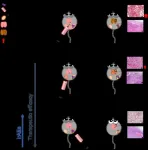(Press-News.org) DURHAM, N.C. -- Researchers studying a group of widespread but often overlooked microbes have identified a climate feedback loop that could accelerate climate change. But it’s not all bad news: this one comes with an early warning signal.
Using a computer simulation, a team of scientists from Duke University and the University of California, Santa Barbara, showed that most of the world’s ocean plankton and many other single-celled creatures in lakes, peatlands and other ecosystems could cross a threshold where instead of soaking up carbon dioxide, they start doing the opposite. That’s because of how warming affects their metabolism.
Because carbon dioxide is a greenhouse gas, that in turn could drive up temperatures further -- a positive feedback loop that could lead to runaway change, where small amounts of warming have an outsized impact.
But by carefully monitoring the abundances of these organisms, we might be able to anticipate the tipping point before it gets here, the researchers report in a study published June 1 in the journal Functional Ecology.
In the new study, researchers focused on a group of tiny organisms called mixotrophs, so named because they mix up two modes of metabolism: they can photosynthesize like a plant or hunt food like an animal, depending on conditions.
“They're like the Venus fly traps of the microbial world,” said first author Daniel Wieczynski, a postdoctoral associate at Duke.
During photosynthesis, they soak up carbon dioxide, a heat-trapping greenhouse gas. And when they eat, they release carbon dioxide. These versatile organisms aren’t considered in most models of global warming, yet they play an important role in regulating climate, said senior author Jean P. Gibert of Duke.
Most of the plankton in the ocean -- things like diatoms, dinoflagellates -- are mixotrophs. They’re also common in lakes, peatlands, in damp soils and beneath fallen leaves.
“If you were to go to the nearest pond or lake and scoop a cup of water and put it under a microscope, you’d likely find thousands or even millions of mixotrophic microbes swimming around,” Wieczynski said.
“Because mixotrophs can both capture and emit carbon dioxide, they're like ‘switches’ that could either help reduce climate change or make it worse,” said co-author Holly Moeller, an assistant professor at the University of California, Santa Barbara.
To understand how these impacts might scale up, the researchers developed a mathematical model to predict how mixotrophs might shift between different modes of metabolism as the climate continues to warm.
The researchers ran their models using a 4-degree span of temperatures, from 19 to 23 degrees Celsius (66-73 degrees Fahrenheit). Global temperatures are likely to surge 1.5 degrees Celsius above pre-industrial levels within the next five years, and are on pace to breach 2 to 4 degrees before the end of this century.
The analysis showed that the warmer it gets, the more mixotrophs rely on eating food rather than making their own via photosynthesis. As they do, they shift the balance between carbon in and carbon out.
The models suggest that, eventually, we could see these microbes reach a tipping point -- a threshold beyond which they suddenly flip from carbon sink to carbon source, having a net warming effect instead of a cooling one.
This tipping point is hard to undo. Once they cross that threshold, it would take significant cooling -- more than one degree Celsius -- to restore their cooling effects, the findings suggest.
But it’s not all bad news, the researchers said. Their results also suggest that it may be possible to spot these shifts in advance, if we watch out for changes in mixotroph abundance over time.
“Right before a tipping point, their abundances suddenly start to fluctuate wildly,” Wieczynski said. “If you went out in nature and you saw a sudden change from relatively steady abundances to rapid fluctuations, you would know it’s coming.”
Whether the early warning signal is detectable, however, may depend on another key factor revealed by the study: nutrient pollution.
Discharges from wastewater treatment facilities and runoff from farms and lawns laced with chemical fertilizers and animal waste can send nutrients like nitrate and phosphate into lakes and streams and coastal waters.
When Wieczynski and his colleagues included higher amounts of such nutrients in their models, they found that the range of temperatures over which the telltale fluctuations occur starts to shrink until eventually the signal disappears and the tipping point arrives with no apparent warning.
The predictions of the model still need to be verified with real-world observations, but they “highlight the value of investing in early detection,” Moeller said.
“Tipping points can be short-lived, and thus hard to catch,” Gibert said. “This paper provides us with a search image, something to look out for, and makes those tipping points -- as fleeting as they may be -- more likely to be found.”
This research was supported by grants from the Simons Foundation (689265), the National Science Foundation (1851194), and the U.S. Department of Energy (DE-SC0020362).
CITATION: "Mixotrophic Microbes Create Carbon Tipping Points Under Warming," Daniel J. Wieczynski, Holly V. Moeller and Jean P. Gibert. Functional Ecology, May 23, 2023. DOI: 10.1111/1365-2435.14350
# # #
END
Little-known microbes could help predict climate tipping points
Rising temperatures could push ocean plankton and other single-celled creatures toward a carbon tipping point that fuels more warming. But new research shows it’s also possible to detect early distress signals before they get there.
2023-06-01
ELSE PRESS RELEASES FROM THIS DATE:
Makers of PFAS ‘forever chemicals’ covered up the dangers
2023-06-01
The chemical industry took a page out of the tobacco playbook when they discovered and suppressed their knowledge of health harms caused by exposure to PFAS (per- and polyfluoroalkyl substances), according to an analysis of previously secret industry documents by UC San Francisco (UCSF) researchers.
A new paper published May 31, 2023, in Annals of Global Health, examines documents from DuPont and 3M, the largest manufacturers of PFAS, and analyzes the tactics industry used to delay public awareness of PFAS toxicity and, in turn, delay regulations governing their use. PFAS are widely used chemicals in clothing, ...
Antipsychotic drugs use increased in Canadian long-term care homes in first year of pandemic
2023-06-01
While most aspects of care quality in long-term care homes did not differ in the first year of the pandemic from pre-pandemic levels, a new study shows that the use of antipsychotic drugs increased in all provinces.
The study analyzed health system performance reports provided by the Canadian Institute for Health Information (CIHI) over three years: two before the pandemic and the first year of COVID-19. The reports are based on more than half a million resident assessments completed in Ontario, Manitoba, Alberta and British Columbia.
Researchers ...
Northsiders are more connected to nature than southsiders: study
2023-06-01
New research into Melburnians’ connection to nature is helping the City of Melbourne understand how to engage its community members in conservation efforts.
The study, led by RMIT University in collaboration with the City of Melbourne and Queensland University of Technology, surveyed over 1,500 City of Melbourne residents and visitors on their connection to nature and found nearly 75% of respondents had a high connection to nature.
More than 75% of respondents said they were concerned about climate change and the destruction of nature.
However, retirees and university students who have lived most of their lives in the Melbourne ...
Preventing truck crashes needs to take ‘dashcam’ approach to driver ‘microsleeps’
2023-06-01
Researchers using dashcam footage of real-world collisions involving large trucks to analyze driver and vehicle behavior has found that anti-drowsiness alarms or similar technologies to prevent falling asleep at the wheel need to go beyond a focus on monitoring the drivers’ eyes, and consider other microsleep behaviors including a relaxation of back and neck muscles and abnormal activity of the vehicle itself.
A study reporting the researchers’ findings was published April 13 in the ...
Improving immune checkpoint inhibitors’ anti-tumor response and minimizing side effects
2023-06-01
Scientists at Tohoku University have discovered a novel approach that improves the efficacy of immune checkpoint blockade (ICB) - a novel form of cancer treatment utilizing immune checkpoint inhibitors (ICIs) - and minimizes the associated side effects. They demonstrated that using ICIs to target tumor-positive lymph nodes generates a robust anti-tumor response against both local and systemic metastases.
The study was published in the Journal of Experimental and Clinical Cancer Research on June 1, 2023.
Our immune system uses “checkpoint proteins” to regulate and control the activity of immune cells. But cancer ...
Taxane-induced peripheral neuropathy in breast cancer: Frequent, clinically significant, and worse with paclitaxel
2023-06-01
Chemotherapy-induced peripheral neuropathy (CIPN) – nerve pain, tingling, or numbness in the hands or feet – is a common side effect of certain cancer treatments, including two drugs frequently used to treat cancer – the taxanes paclitaxel and docetaxel. Initial results from a large study that tracked CIPN in more than 1,100 patients treated for breast cancer with a taxane show a pattern of clinically meaningful, persistent sensory and motor symptoms, with patients experiencing more severe symptoms with paclitaxel than with docetaxel.
These initial results from the SWOG S1714 clinical trial are being reported in an oral presentation at the 2023 annual ...
DOE announces $46 million for commercial fusion energy development
2023-06-01
WASHINGTON, D.C.—The U.S. Department of Energy (DOE) today announced $46 million in funding to eight companies advancing designs and research and development for fusion power plants, representing a major step in President Biden’s commitment to a pilot-scale demonstration of fusion within a decade. Fusion reactions power the stars, and research is underway to make fusion energy production on Earth possible, providing an abundant, inherently safe, non-carbon-emitting energy source for the planet. This funding from the Milestone-Based ...
More than 1 in 6 unvaccinated people report health effects of COVID two years after confirmed infection
2023-06-01
Around 1 in 6 unvaccinated individuals say they are still experiencing health effects of covid-19 up to two years after infection, finds a study from Switzerland published by The BMJ today.
The findings show that 17% of participants did not return to normal health and 18% reported covid-19 related symptoms 24 months after initial infection.
Most people who have covid-19 recover soon after the initial phase of the disease, but others experience persistent health problems (known as long covid), which can impact quality of life ...
Improving emergency, critical and operative care in low and middle-income countries
2023-06-01
DALLAS and GENEVA, May 31, 2023 — Global efforts to improve emergency, critical and operative care for universal health coverage and protection from health emergencies were announced at the 76th World Health Assembly in Geneva, Switzerland. With the support of its partners the American Heart Association and the Laerdal Foundation, the World Health Organization (WHO), announced an initiative based on a new acute care resolution that was approved at this year’s World Health Assembly, the decision-making body of WHO.
Nearly 30 million deaths are due to emergency conditions each year, contributing to half of global deaths. The acute ...
Huntsman Cancer Institute May research highlights
2023-06-01
Huntsman Cancer Institute research highlights shine the spotlight on new discoveries and cutting-edge cancer research. This past month, researchers found a better treatment practice for patients who have melanoma. They also created a model for adrenocortical carcinoma, a rare cancer that originates in the outer portion of the adrenal gland. Learn more about a new brain cancer medication being fast-tracked for FDA approval and how Huntsman Cancer Institute was selected to conduct clinical trials for cancer patients with HIV.
Clinical trial suggests changes to melanoma patient care
A study recounting a clinical trial published ...
LAST 30 PRESS RELEASES:
Blood test “clocks” predict when Alzheimer’s symptoms will start
Second pregnancy uniquely alters the female brain
Study shows low-field MRI is feasible for breast screening
Nanodevice produces continuous electricity from evaporation
Call me invasive: New evidence confirms the status of the giant Asian mantis in Europe
Scientists discover a key mechanism regulating how oxytocin is released in the mouse brain
Public and patient involvement in research is a balancing act of power
Scientists discover “bacterial constipation,” a new disease caused by gut-drying bacteria
DGIST identifies “magic blueprint” for converting carbon dioxide into resources through atom-level catalyst design
COVID-19 vaccination during pregnancy may help prevent preeclampsia
Menopausal hormone therapy not linked to increased risk of death
Chronic shortage of family doctors in England, reveals BMJ analysis
Booster jabs reduce the risks of COVID-19 deaths, study finds
Screening increases survival rate for stage IV breast cancer by 60%
ACC announces inaugural fellow for the Thad and Gerry Waites Rural Cardiovascular Research Fellowship
University of Oklahoma researchers develop durable hybrid materials for faster radiation detection
Medicaid disenrollment spikes at age 19, study finds
Turning agricultural waste into advanced materials: Review highlights how torrefaction could power a sustainable carbon future
New study warns emerging pollutants in livestock and aquaculture waste may threaten ecosystems and public health
Integrated rice–aquatic farming systems may hold the key to smarter nitrogen use and lower agricultural emissions
Hope for global banana farming in genetic discovery
Mirror image pheromones help beetles swipe right
Prenatal lead exposure related to worse cognitive function in adults
Research alert: Understanding substance use across the full spectrum of sexual identity
Pekingese, Shih Tzu and Staffordshire Bull Terrier among twelve dog breeds at risk of serious breathing condition
Selected dog breeds with most breathing trouble identified in new study
Interplay of class and gender may influence social judgments differently between cultures
Pollen counts can be predicted by machine learning models using meteorological data with more than 80% accuracy even a week ahead, for both grass and birch tree pollen, which could be key in effective
Rewriting our understanding of early hominin dispersal to Eurasia
Rising simultaneous wildfire risk compromises international firefighting efforts
[Press-News.org] Little-known microbes could help predict climate tipping pointsRising temperatures could push ocean plankton and other single-celled creatures toward a carbon tipping point that fuels more warming. But new research shows it’s also possible to detect early distress signals before they get there.




